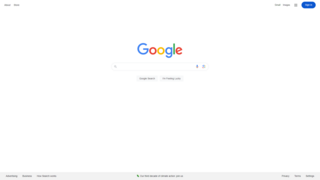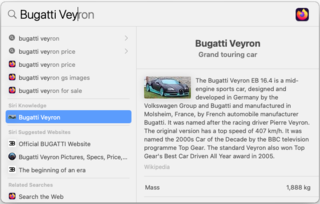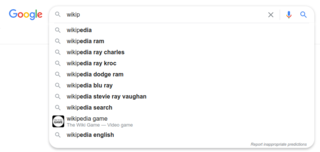
Google Search is a search engine operated by Google. It allows users to search for information on the Internet by entering keywords or phrases. Google Search uses algorithms to analyze and rank websites based on their relevance to the search query. It is the most popular search engine worldwide.
Search engine optimization (SEO) is the process of improving the quality and quantity of website traffic to a website or a web page from search engines. SEO targets unpaid traffic rather than direct traffic or paid traffic. Unpaid traffic may originate from different kinds of searches, including image search, video search, academic search, news search, and industry-specific vertical search engines.

A metasearch engine is an online information retrieval tool that uses the data of a web search engine to produce its own results. Metasearch engines take input from a user and immediately query search engines for results. Sufficient data is gathered, ranked, and presented to the users.

Spotlight is a system-wide desktop search feature of Apple's macOS and iOS operating systems. Spotlight is a selection-based search system, which creates an index of all items and files on the system. It is designed to allow the user to quickly locate a wide variety of items on the computer, including documents, pictures, music, applications, and System Settings. In addition, specific words in documents and in web pages in a web browser's history or bookmarks can be searched. It also allows the user to narrow down searches with creation dates, modification dates, sizes, types and other attributes. Spotlight also offers quick access to definitions from the built-in New Oxford American Dictionary and to calculator functionality. There are also command-line tools to perform functions such as Spotlight searches.

Startpage is a Dutch search engine company that highlights privacy as its distinguishing feature. The website advertises that it allows users to obtain Google Search results while protecting users' privacy by not storing personal information or search data and removing all trackers. Startpage.com also includes an Anonymous View browsing feature that allows users the option to open search results via proxy for increased anonymity.
Yahoo! Search is a search engine owned and operated by Yahoo!, using Microsoft Bing to power results.
Search engine marketing (SEM) is a form of Internet marketing that involves the promotion of websites by increasing their visibility in search engine results pages (SERPs) primarily through paid advertising. SEM may incorporate search engine optimization (SEO), which adjusts or rewrites website content and site architecture to achieve a higher ranking in search engine results pages to enhance pay per click (PPC) listings and increase the Call to action (CTA) on the website.

A search engine is a software system that provides hyperlinks to web pages and other relevant information on the Web in response to a user's query. The user inputs a query within a web browser or a mobile app, and the search results are often a list of hyperlinks, accompanied by textual summaries and images. Users also have the option of limiting the search to a specific type of results, such as images, videos, or news.

Microsoft Bing, commonly referred to as Bing, is a search engine owned and operated by Microsoft. The service traces its roots back to Microsoft's earlier search engines, including MSN Search, Windows Live Search, and Live Search. Bing offers a broad spectrum of search services, encompassing web, video, image, and map search products, all developed using ASP.NET.
A search engine results page (SERP) is a webpage that is displayed by a search engine in response to a query by a user. The main component of a SERP is the listing of results that are returned by the search engine in response to a keyword query.

Google Images is a search engine owned by Google that allows users to search the World Wide Web for images. It was introduced on July 12, 2001, due to a demand for pictures of the green Versace dress of Jennifer Lopez worn in February 2000. In 2011, reverse image search functionality was added.
Social search is a behavior of retrieving and searching on a social searching engine that mainly searches user-generated content such as news, videos and images related search queries on social media like Facebook, LinkedIn, Twitter, Instagram and Flickr. It is an enhanced version of web search that combines traditional algorithms. The idea behind social search is that instead of ranking search results purely based on semantic relevance between a query and the results, a social search system also takes into account social relationships between the results and the searcher. The social relationships could be in various forms. For example, in LinkedIn people search engine, the social relationships include social connections between searcher and each result, whether or not they are in the same industries, work for the same companies, belong the same social groups, and go the same schools, etc.
Keyword research is a practice search engine optimization (SEO) professionals use to find and analyze search terms that users enter into search engines when looking for products, services, or general information. Keywords are related to search queries.
The Facebook Platform is the set of services, tools, and products provided by the social networking service Facebook for third-party developers to create their own applications and services that access data in Facebook.

DuckDuckGo is an American software company that offers a number of products intended to help people protect their online privacy. The flagship product is a search engine that has been praised by privacy advocates. Subsequent products include extensions for popular web browsers and a new web browser.

Reverse image search is a content-based image retrieval (CBIR) query technique that involves providing the CBIR system with a sample image that it will then base its search upon; in terms of information retrieval, the sample image is very useful. In particular, reverse image search is characterized by a lack of search terms. This effectively removes the need for a user to guess at keywords or terms that may or may not return a correct result. Reverse image search also allows users to discover content that is related to a specific sample image or the popularity of an image, and to discover manipulated versions and derivative works.
Personalized search is a web search tailored specifically to an individual's interests by incorporating information about the individual beyond the specific query provided. There are two general approaches to personalizing search results, involving modifying the user's query and re-ranking search results.
Contextual search is a form of optimizing web-based search results based on context provided by the user and the computer being used to enter the query. Contextual search services differ from current search engines based on traditional information retrieval that return lists of documents based on their relevance to the query. Rather, contextual search attempts to increase the precision of results based on how valuable they are to individual users.
Search engine scraping is the process of harvesting URLs, descriptions, or other information from search engines. This is a specific form of screen scraping or web scraping dedicated to search engines only.

Searx is a free and open-source metasearch engine, available under the GNU Affero General Public License version 3, with the aim of protecting the privacy of its users. To this end, Searx does not share users' IP addresses or search history with the search engines from which it gathers results. Tracking cookies served by the search engines are blocked, preventing user-profiling-based results modification. By default, Searx queries are submitted via HTTP POST, to prevent users' query keywords from appearing in webserver logs. Searx was inspired by the Seeks project, though it does not implement Seeks' peer-to-peer user-sourced results ranking.










